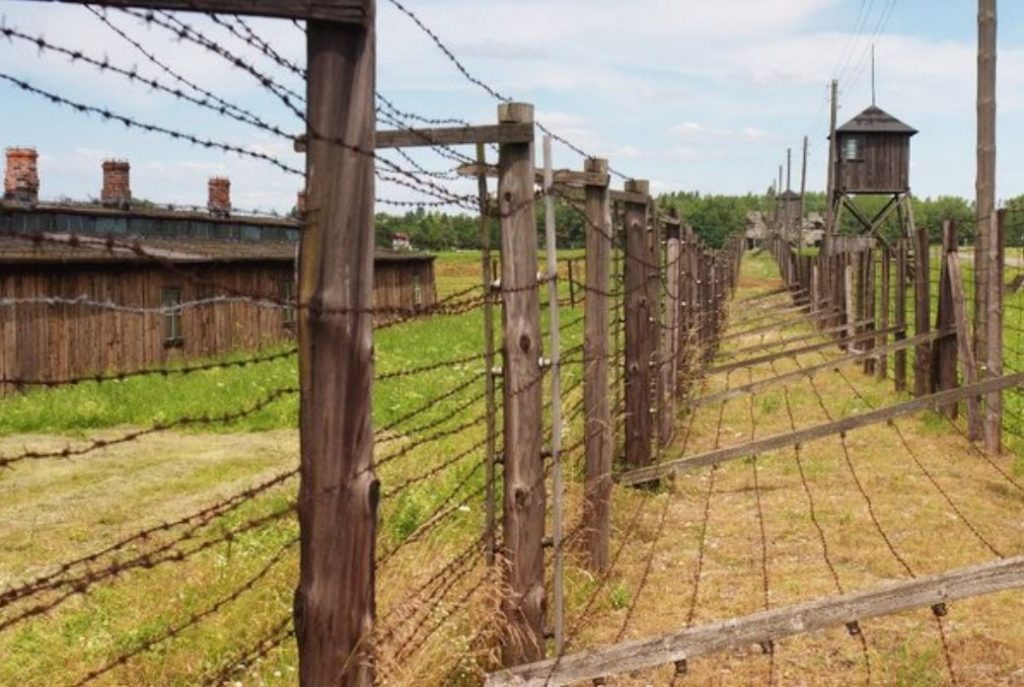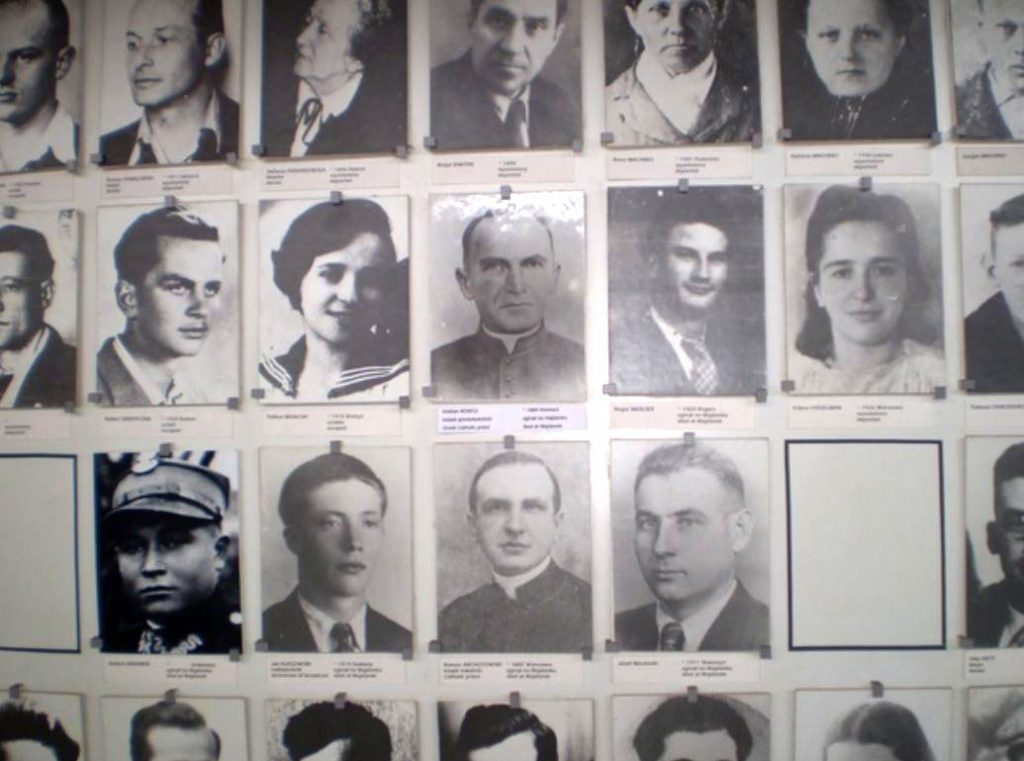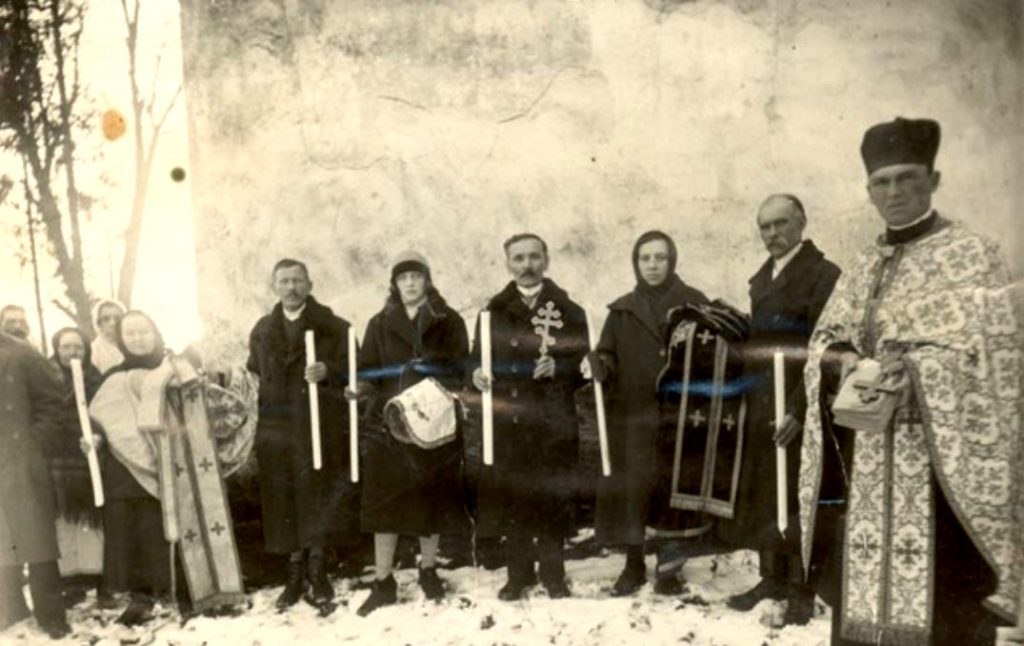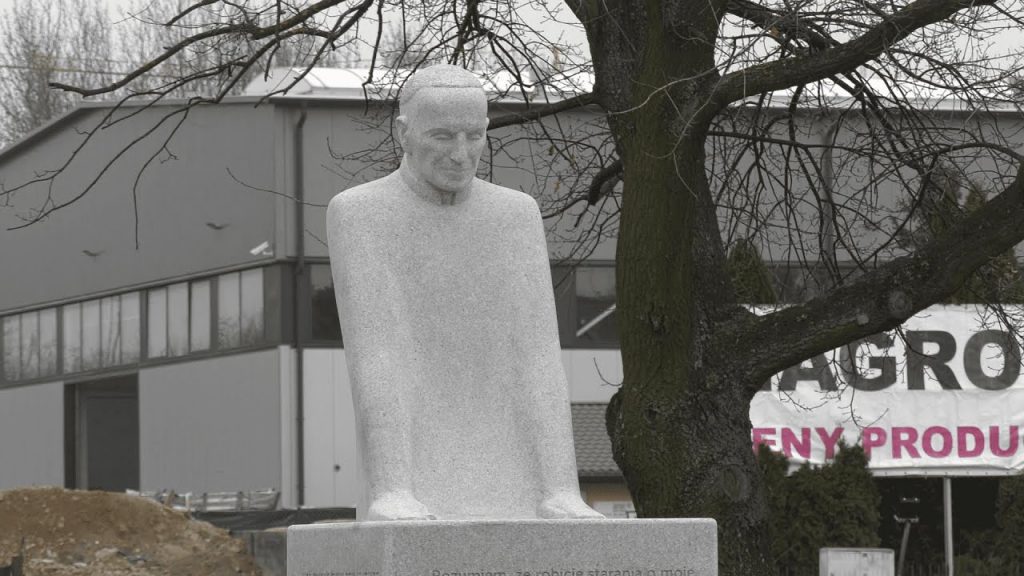“There was a long-standing initiative to erect a monument in Lublin”: A conversation about the martyred priest Omelian Kovch
On 25 March 2021, a monument to the Ukrainian Greek Catholic priest Omelian Kovch was erected in Lublin, Poland, next to the Majdanek State Museum, founded on the grounds of the Majdanek death camp. At the cost of his own life, Rev. Kovch saved hundreds of Jews in the Lviv region during the Holocaust.
A conversation about Rev. Omelian Kovch with a scholar who is conducting research on him: the historian Volodymyr Birchak, head of the academic program at the Center for Research on the Liberation Struggle and editor of the online newspaper Istorychna Pravda.
Iryna Slavinska: How important and exceptional is this event?
Volodymyr Birchak: This event is quite important; it was a long time coming. The installation of a monument in Lublin, next to the concentration camp where the blessed martyred priest Omelian Kovch died, was a long-standing initiative. Everything was ready for the unveiling last year [2020], but the pandemic proved to be an obstacle. This year we managed to erect the monument.
The monument was designed by the sculptor Oleksandr Diachenko and the architect Marta Diachenko. It is worth mentioning the work done by the Committee to Honor the Memory of His Beatitude, the Martyred Priest Omelian Kovch, which put forward the plan to create this monument, financed it and publicized it to ensure that it would be erected.
Iryna Slavinska: What is the point of erecting commemorative markers of this type?
Volodymyr Birchak: This story is known in Ukraine, but by far not by everyone. Kovch is known in Ukraine, but not to a great extent. As for Poland, he is not a well-known figure there either. That said, work is being done in Poland to popularize him, and a Polish-language film has come out. So, I think that this initiative—erecting a monument—is an excellent one, and it will draw the Poles’ attention to this figure.
Iryna Slavinska: What did Rev. Omelian Kovch, the “parish priest of Majdanek,” do in the concentration camp?
Volodymyr Birchak: We have documented testimonies—letters that he managed to pass on to his family. These letters have been preserved, and we know that Kovch wrote about his priestly ministry:
“I am grateful to God for His goodness to me. Apart from Heaven, this is the only place where I would like to be. We are all equal here: Poles, Jews, Ukrainians, Russians, Lithuanians, and Estonians. I am the only priest here. I cannot imagine what they would do without me.
Here I can see God—the one God for everyone, regardless of our religious differences. Our churches may be different, but Almighty God reigns among all of them. When I serve the Liturgy, they all pray. They pray in various languages, but does God not understand all languages? They die in different ways, and I help them cross the bridge.
Is this not a blessing? Is this not the finest crown that God could place on my head? It is. I thank God a thousand times a day that He sent me here. I could not ask Him for anything greater. Do not fall into despair because of me. Rejoice with me. Pray for those who created this camp and this system. They need your prayers the most…May the Lord have mercy on them…”
This is truly fascinating because there are not many examples of Ukrainian priests serving liturgies in Nazi concentration camps. They could serve liturgies for themselves. Kovch gathered around himself prisoners of various nationalities and religious affiliations. There are very few such facts, even from the Dachau concentration camp, which was partly a concentration camp for priests. This is the uniqueness of Rev. Kovch.
If we do a comparison with Soviet concentration camps, the history is profoundly different. In Soviet concentration camps, priests were more able to conduct this kind of pastoral activity. We also have countless testimonies about Josyf Slipyj’s incarceration in the camps and about Mykola Chernetsky, who served liturgies. We have access to countless facts about the fact that liturgies were served even during the transport of prisoners under escort when prisoners were transported by ship to camps located beyond the polar circle.

Iryna Slavinska: Omelian Kovch was beatified in 2001. What does this mean?
Volodymyr Birchak: This happened during Pope John Paul II’s visit [to Ukraine—Trans.], during which Rev. Kovch was beatified. This event was preceded by the lengthy process of beatification, a procedure involving the meticulous study of a candidate’s every biographical detail in order to determine whether he merits this title. Kovch is the only beatified martyred priest who died at the hands of the Nazis. All the rest were victims of the communist regime. The solemn proclamation of Rev. Kovch as a Protector of Pastors of the Ukrainian Greek Catholic Church took place in 2009.

Iryna Slavinska: What did Omelian Kovch do in 1939?
Volodymyr Birchak: This is at once a very interesting and tragic story: the change of occupying regimes on the territory of Ukraine. Ukraine becomes the epicenter of a world war once again. The change of these regimes demonstrates his humanity and the fact that he followed the commandment to love his neighbor. He was an extraordinary personality and held very firm convictions.
In 1919 Kovch was the chaplain of the Ukrainian Galician Army. His biography contains many interesting episodes. For example, he spent nearly all his time with the soldiers on the front line, which is not typical of chaplains. When he was asked why he did this, Kovch replied: “I know that a soldier on the front line feels best when he sees a medic and a pastor next to him.” He also joked: “Do you know that I am a priest? A bullet cannot take down a priest.”
Kovch’s activities in the Ukrainian Galician Army did not simply end. He was genuinely convinced that Ukrainians should have their independent state. He had a very clear-cut political position. He never ended his pro-Ukrainian activities during the period when Western Ukraine was occupied by the Poles. We have facts at our disposal which show that during the Second Rzeczpospolita Kovch was a member of the Organization of Ukrainian Nationalists and was responsible for propaganda matters. Other facts reveal that during this period, Rev. Kovch’s home was searched on forty occasions, most of which culminated in arrest and imprisonment. Kovch was imprisoned a number of times for long and short durations. During one imprisonment, he wrote a book.
In 1939, when the “honeymoon of Nazism and communism” began, the first victims of Soviet repressions on the territory of Western Ukraine were not Ukrainians but Poles. They were members of various types of law enforcement and security structures: the police and intelligence services. Or Polish government officials. Most of them were convicted or deported to special settlements. Kovch was one of the first to come to the aid of the Poles. Many, many families had been left without their breadwinners, and he rushed to help them. At one point, a Polish woman said to him: “How can you help me when literally a short time ago my husband carried out searches of your home?” Kovch laughed and said that it was his duty.
Iryna Slavinska: To be honest, the OUN does not have the best reputation in the context of the Second World War and its attitudes to various communities of Ukraine. There will be another program to discuss the contexts and what is true or false, but I venture to say that it may strike many of our listeners as paradoxical that Omelian Kovch was a member of the OUN and simultaneously saved Jews during the Holocaust.
Volodymyr Birchak: Perhaps for some, it will sound paradoxical but Ukrainian nationalists, and representatives of Ukrainian nationalist organizations, were not exceptions in the context of saving victims from the Shoah. We know, for example, about Fedir Vovk, a well-known Ukrainian nationalist in Dnipropetrovsk, and about Kovch, both of whom rescued Jews. The OUN is not some kind of absolutely black, fascistic, or antisemitic organization. Obviously, as in every structure, there were exceptions, and we have many such examples and one such example is Omelian Kovch.
Iryna Slavinska: There are documented cases showing that Omelian Kovch saved Jews during the Holocaust. Can you provide a more detailed description of them?
Volodymyr Birchak: We have many documented cases. One of the most interesting dates to late August-early September 1941. It is documented in the memoirs of Jews. A group of Nazis arrived in Peremyshliany in order to carry out an anti-Jewish operation. At the time, a religious service was taking place in a synagogue. The Nazis brought all the other Jews to the synagogue, locked it, and threw an incendiary mixture through the windows. They wanted to burn alive the Jews of Peremyshliany.
The testimony of Leopold Kleman Kozlowski reveals that at this moment, a Roman Catholic priest, together with the local community, rushed to Kovch’s house to say that something needed to be done and that people could die. Kovch rushed to their aid. Speaking German, he told the soldiers to allow him to enter the temple at once. They were astounded by the priest’s position and let him through. He opened the door of the synagogue and began carrying out people, half of whom had lost consciousness inside.
One of the persons he carried out was who he thought was a child, someone who was near the door and who he carried out into the fresh air. He then returned into the building to save more people. But this was not a child. It was the well-known Belz Rabbi Aharon Rokeach, who was very, very short in stature and mistaken for a child by Kovch. In 1939 the rabbi had fled from Belz in the Nazi zone of occupation to Peremyshliany in the Soviet zone and thus in 1941 was saved by Omelian Kovch. Later, with the help of Omelian Kovch’s son Serhii Kovch and the mayor of Peremyshliany Mykhailo Shkilnyk, Aharon Rokeach was smuggled out to Hungary, which as is known did not have such an antisemitic policy until it was occupied by the Nazis in 1944. From Hungary, Rokeach went onward to Palestine and awaited the proclamation of the State of Israel. This is one example of who Kovch saved.
We can list other examples. Kozlowski recalled that when he was in the ghetto with his family, Kovch, despite the prohibition, often entered the ghetto bringing food, clean underwear, medicines, and other things.
Another way to rescue Jews was issuing so-called Aryan documents: records of baptisms from church books. Kovch did this. There is a discussion here. Yad Vashem, the World Holocaust Remembrance Center in Israel, has stated that if priests saved Jews by means of baptism, then this cannot be considered a rescue because they derived personal advantages from converting Jews to their faith. But concerning Kovch and many other priests in Western Ukraine, they often did not conduct the rite of baptism. They understood that Jews needed help in the form of such documents. They often simply falsified the entries to say they were baptized. That is how Rubin and Ida, brother and sister, were saved from the Holocaust; they later submitted their testimonies about their rescue by Omelian Kovch to Yad Vashem. As of 2012, they were living in New York. These cases are documented.

Iryna Slavinska: How much of this story has been told?
Volodymyr Birchak: This story is present in the Ukrainian space. I think that in the Polish space, it is being revealed gradually, but we must publicize Kovch’s biography among the general public and disseminate it for the world to know.
I hope that this year or the next, my sizable research on Kovch will come out in book form. I have collected documents and eyewitness reports about him for nearly ten years. Perhaps in time, the book will be translated.
This program is created with the support of Ukrainian Jewish Encounter (UJE), a Canadian charitable non-profit organization.
Originally appeared in Ukrainian (Hromadske Radio podcast) here.
Translated from the Ukrainian by Marta D. Olynyk.
Edited by Peter Bejger.
NOTE: UJE does not necessarily endorse opinions expressed in articles and other materials published on its website and social media pages. Such materials are posted to promote discussion related to Ukrainian-Jewish interactions and relations. The website and social media pages will be places of information that reflect varied viewpoints.




















